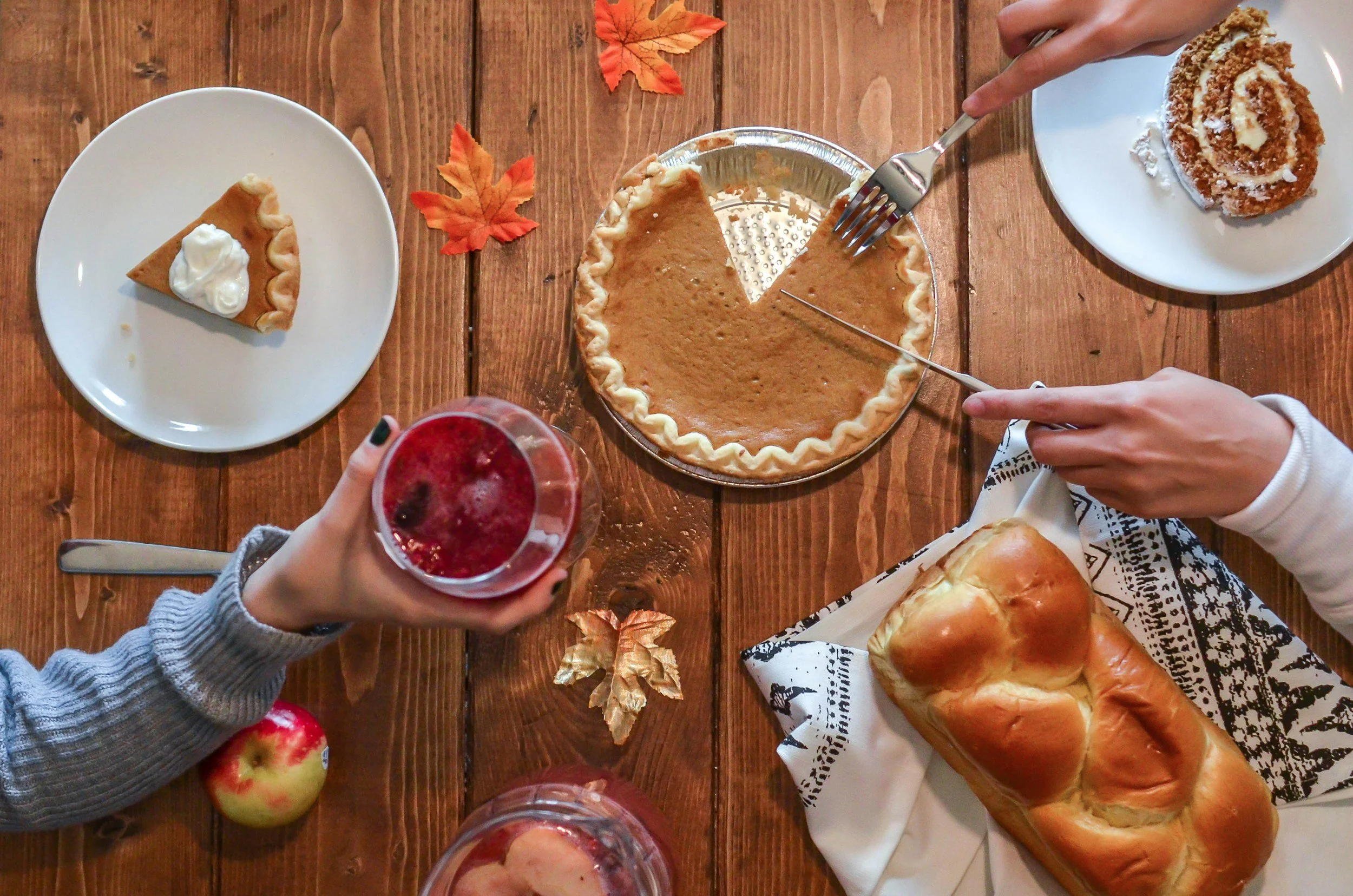14 Tips to Survive the Holidays in Eating Disorder Recovery
Written by: Allyson Inez Ford, MA, LPCC
‘Tis the Season…for stress?
The holiday season is upon us, and it’s a stressful time for many people. Parents feel the pressure of making sure their kids have the most magical, Pinterest worthy experience. Introverts feel pressure to travel and visit extended family even though they might rather stay in the comfort of their own home. At work, people are scrambling to meet end of year deadlines; and students are studying for finals. Kids are often overstimulated and out of their routines- noticing more tantrums, anyone?!
Eating Disorders and Food Centric Holidays- The ultimate Trigger
And for folks struggling with an eating disorder? Most likely they are gearing themselves up for a whirlwind of triggers- considering all of the holiday celebrations have one thing in common: feasts. Feasts with family members who might be part of the problem (hopefully not, but this isn’t uncommon). I know for me, holiday gatherings during my eating disorder were very challenging. I didn’t want to draw too much attention to myself by not eating, but I also was terrified of all the ‘extra’ calories I was expected to consume that day. I even remember feeling angry that I had to eat foods out of my safe foods, and most of the foods provided weren’t really things I super loved. The eating disorder voice in me screamed some version of: “This is a waste of calories for food you don’t even want. You’ll have to make up for this by restricting harder and exercising longer.”
Self punishment and Cultural Reinforcement
Holidays became about hiding, self punishment and a lot of masking. I didn’t want to ‘ruin’ the holidays for anyone around me and I didn’t want anyone to confront me about my strange behavior with food. So I just pretended. And it felt awful. It felt so isolating to hide my true thoughts and feelings while everyone around me seemed so happy and excited about the food. It was also a time when my eating disorder beliefs would be even more reinforced by the culture. Comments like “I’ll have to burn this off later!” or “I’m saving up my calories for later!” just reinforced the belief that I should do this too, and that this was a “normal” relationship to food. The interesting thing I noticed, most people would say those things but not actually do them. They would still eat something throughout the day. They might have exercised but no different than they usually would. My brain though? It took it to the extreme. It even saw it as a “challenge.”
Eating Disorders are The Theif of Joy
All of this is obviously really unhealthy and took me so far away from actually being able to enjoy the holidays. Obsessing about food and your body in your mind when your cousins are all laughing about the latest inside joke that you just missed because you were so in your head- really sucks. Seeing your child’s eyes light up with joy and excitement, but not feeling present for it and just wanting the day to be over- really, really sucks. Eating disorders disconnect us from our relationships and our values, and the holidays just seem to highlight this.
Reclaiming the Day and Coping Ahead
Once I began recovery, I came up with several strategies with my team to help me cope with the day in a more values based way. There would be some gentle challenging the eating disorder, while also not expecting perfection of myself. Having permission to eat and not compensate (from my treatment team who I really trusted), strangely helped me quiet that voice in my head that said otherwise. Now, with my own clients, I help them develop a similar coping plan ahead of the holiday event so that stress and triggers can be managed more effectively. I encourage you to do the same.
Here are 14 tips that have helped me and my clients:
Maintain eating structure timing and meal plan as best as you can. Even if others are not eating at regular times, focus on your own needs and goals. You need consistent food to recover from an eating disorder.
Resist the pressure to restrict for the holiday meal, this will likely trigger continued restriction or a binge and purge cycle.
Have a support and accountability partner to help you stay mindful of this intention: a friend in recovery, recovery coach or trusted family member are some great options.
Utilize harm reduction strategies specific to the eating disorder behaviors you struggle with.
Ask yourself: how do I want to look back & remember this holiday? Journal about it and set intentions for the day.
Act according to what your future self will thank you for, not what your eating disorder will thank you for.
Practice self compassion: "it's okay for this is an extra hard day, I am doing the best I can."
Hold onto your “why” for recovery. List them in your phone and reference them before facing a challenging food situation.
Set boundaries with family members beforehand: let them know what is and isn't helpful during holidays meals (ie. food/body talk/desire for distraction or not/ help with plating meals or need for autonomy)
If boundaries are not respected, give yourself permission to leave early.
Remember that your recovery is your #1 priority and it's not selfish to put your mental health first- it's necessary. If you had cancer, would you feel selfish for needing to leave an environment to protect your health? Eating disorders are life threatening, too, so why treat it any different?
Identify possible triggers & make a 'cope ahead plan' with your therapist.
Keep appointments with your team or peer supports as much as possible to help with accountability.
Make space for uncomfortable feelings. Research shows 2/3 of people report the holidays being an extra stressful or emotionally distressing time, you are NOT alone and it’s doesn't have to be perfect for it to be enjoyable.
*Of course, not every one will resonate with every tip or reminder, but commit to trying a few and see what happens! Talk through these options with a therapist who specializes in eating disorders and make sure trusted loved ones are also aware of how to support you.
Final Thoughts
You deserve a life free from the constant pain of an eating disorder. You deserve freed up brain space to be present with your loved ones and to live the life you truly want to be living. Healing is possible, it’s hard, but very possible. Focus on one step at a time, one day at a time and it can happen. I believe in your ability to get there. If you are interested in starting eating disorder therapy in CA, WA, UT, MD or FL- my practice would be honored to support you. Most of us have lived experience, in addition to extensive professional training. We don’t judge or pressure, we meet you where you are at!


